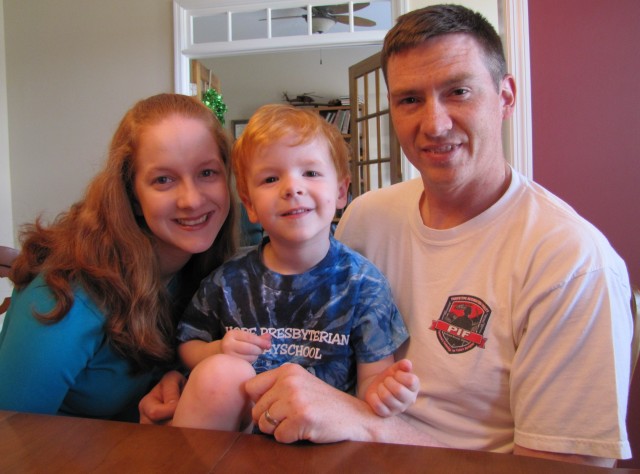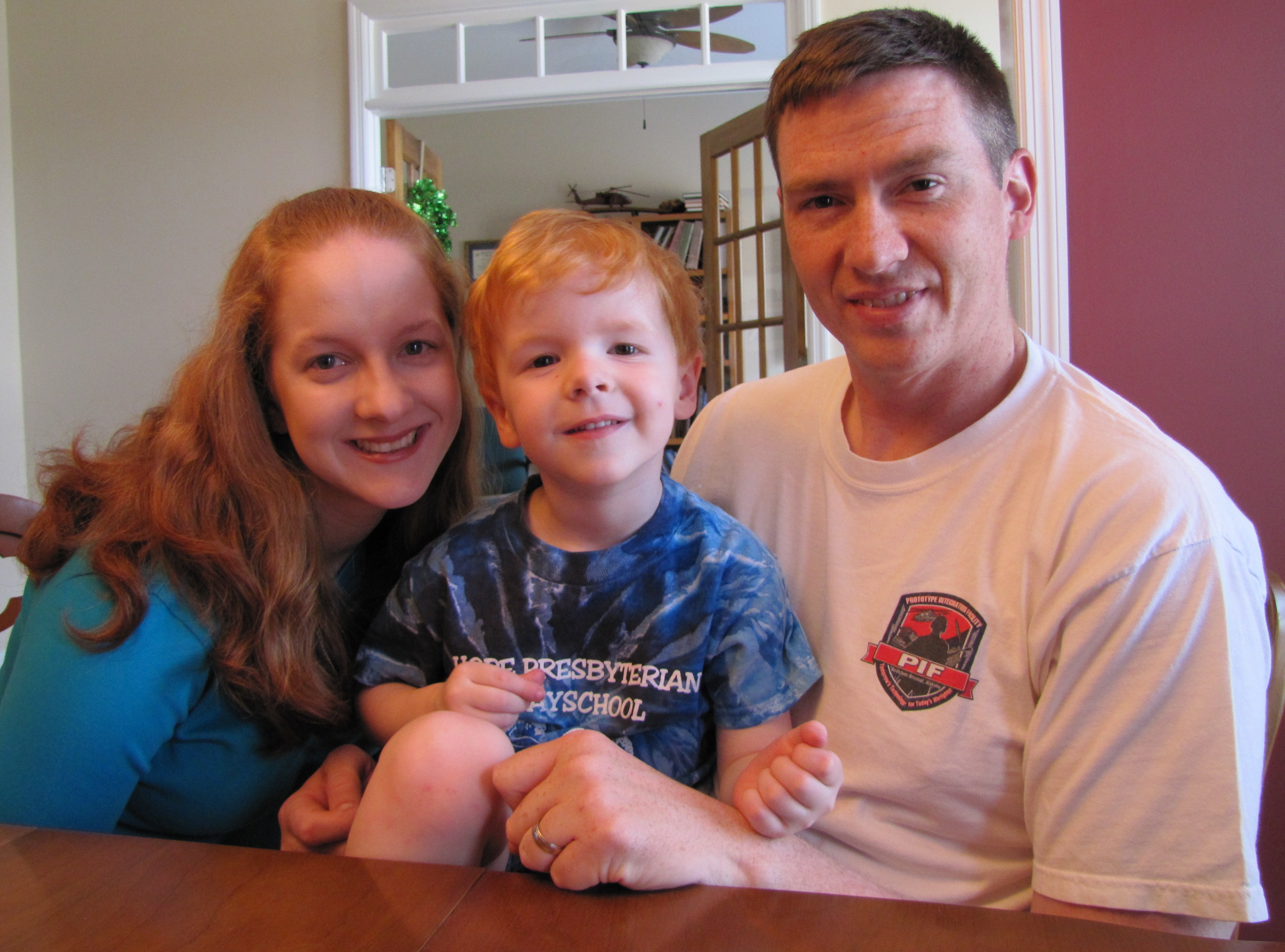
REDSTONE ARSENAL, Ala. -- Capt. David Borders spent his Easter Sunday painting eggs and then hunting for them with his 3-year-old son Will, and neighborhood friends and family.
The holiday activities were 6,000 miles away from where Borders and the 152 Soldiers of the Reserve's 375th Engineer Company had been only a week earlier.
Borders, commander of the 375th, made a commitment to himself and his Soldiers to have his unit home before Easter. That commitment became reality about 12 hours before Easter sunrise services, when a chartered Miami Air jet carrying Soldiers of the 375th landed in the late afternoon hours April 3 at Signature Flight Support at Huntsville International Airport. The Soldiers were greeted by cheering family and friends.
"I really wanted to bring them home before Easter," Borders said.
The 375th left Huntsville for deployment last April. They spent a month and a half training in Wisconsin and California, arrived in Kuwait on June 1 and then Iraq on June 16. Their return flight to Huntsville ended a 10-month deployment, during which Soldiers worked at various locations in southern Iraq to build facilities in support of the Army and its mission.
"Everybody was ready to get back home and be done with the deployment," Borders said. "We were all ready to get back to some sort of normalcy. As citizen Soldiers, we all have employers to get back to, and families and communities to reconnect with."
Based at Camp Adder in Tallil, Iraq, the 375th supported the Army's 7th Engineering Battalion. It replaced a 120-Soldier Army Engineer Clearance Company, a 50-plus Navy SEAL detachment and a 50-plus Air Force Red Horse detachment. Its Soldiers were split into three platoons of "vertical engineers" - many of whom were experienced plumbers, carpenters and electricians - charged with building anything from latrine showers to helicopter pads.
"Our platoons were all over the place. They were outside the wire for weeks and months at a time," Borders said.
"We supported the coalition forces over there, which are now primarily U.S. Soldiers. We built dining facilities, installed showers and built things that improved the quality of life for Soldiers lingering over there. All the construction projects assigned to us were in support of the war fighter."
However, the 375th also worked with the Commanders Emergency Relief Program, providing expertise in the building of a school for Iraqi school children.
"We were in a partnership with Iraqis," Borders said. "The majority of our labor force was supplied by the Iraqi Army. We didn't build anything directly for Iraqi civilians, but rather for teams supporting Iraqis through the CERP.
"Our FRG (family readiness group) was able to get school supplies, backpacks and other things delivered to us and we gave these to the school principal when we had the ribbon cutting."
One of the 375th's platoons spent eight to nine months at Contingency Operating Station Garry Owen, building 30 different structures.
"We started a dining facility the same week we got into theater," Borders said.
Another platoon was posted at the Contingency Operating Base in Basra, where they worked on a three-month project to build a new runway and helicopter pads in support of the 34th Infantry Division. It was a 20-acre project involving three runway strips and 20 parking pads. It took 6,000 to 8,000 cubic meters of cement to complete the project.
"Iraqis are in the process of taking back control of their country," Borders said. "The runway was crucial to giving them back the airport the 34th ID had been using.
"It was a tough project for many reasons. Each day 20 cubic meters of concrete was delivered on each of five trucks brought in by a local Iraqi contractor. We had to contend with the communication gap between us and the Iraqis so that they understood the consistency of the concrete that we wanted, where to dump it and things like that. The language was a big hurdle to overcome."
The third platoon worked at various locations - such as Joint Security Stations Jenkins and Soto, and Camps Ur and Adder -- to build southwest Asian huts used by the 28th Combat Air Brigade.
The 375th's Soldiers also built a tactical operations center, chapel and FMWR facilities.
Borders said many of the issues his Soldiers faced dealt with building supplies.
"We had problems with warped wood or with getting supplies that weren't adequate, like a 7-ton air conditioning unit when we needed a 10-ton unit," he said.
"The good thing about Reservists is that we are extremely flexible. We are trained to react to any environment and still get the job done. We adapted and overcame. That's something engineers are good at."
Along with the challenge of their work, Soldiers also had to stay proficient in patrol duties so that they could protect their platoons as they traveled through southern Iraq in MRAPs (Mine Resistant Ambush Protected vehicle).
"We didn't even use Humvees when we patrolled out to our work sites," Borders said. "They are now using an IED (improvised explosive device) known as EFP (explosively formed projectile). It is a homemade missile that can eat through anything. The MRAPs provided far better protection against EFPs.
"The threats were always serious in the sense that the possibility was there to be catastrophic in damage and lives lost."
Although the 375th didn't experience an EFP attack, Soldiers were occasionally fired on at some of the outlying posts.
"It was all indirect fire in terms of them being mortars and old rockets that could be fired with no control over where they went," Borders said. "They would aim them where they thought Soldiers were. Two to three would be fired one after the other. But once fired, they had no control over them."
A week before the 375th left Iraq, indirect fire came in at Camp Adder, about 20 yards from the tactical operations center where Borders was working.
"I heard the incoming. There was impact, but there was no explosion," he said. "We were well-protected. The whole area at Camp Adder is surrounded by huge 25-foot T walls. There are also systems in place to attack incoming fire."
For many of the Soldiers, staying in touch with home was easy thanks to e-mail and the Skype personal home video teleconferencing system. But the time difference and long work hours often made it difficult to touch base with home at a good time of day.
"We were working almost the whole time," Borders said. "We worked six days a week, 14 to 16 hour days. I also worked eight to 10 hours on my down days. Many of the Soldiers had personal computers, and they took advantage of the USO and MWR programs that were offered."
With the 375th now home, Borders said his Soldiers will rebuild their civilian lives and use the next year to prepare for another employment.
"This will be a rebuilding year," he said. "I will work to rebuild my team and start looking at who the next group of leaders will be and get ready for the next deployment."
Borders, who works for Sikorsky Aircraft at its local engineering office, won't report for a few weeks. Right now, he is spending time with his wife Michelle; playing games with his son; refinancing his mortgage and taking care of things around the house. He admits it is hard readjusting to civilian life.
"I feel like I should be doing something. I feel like I'm wasting time," he said, comparing his reacquired civilian life to the up-tempo environment of Iraq. "I'm antsy. I feel like there is something that I am supposed to be doing and I am going to pay the price later for not doing it.
"Everything was so fast paced over there. It was like herding cats all the time. As a commander, all the Soldiers' problems become your problems. It is good to be home and not deal with those kind of daily crises and fires to put out."
Borders is proud of the work his Soldiers did during their deployment.
"We made some good contributions there," he said. "I feel the people in Iraq are very much ready to take control. We were replaced by a Reserve unit from Rockford, Ill. But they might not be there for an entire deployment because of the responsible drawdown that is planned. By building the runway and other facilities there, I feel the 375th had a big hand in the responsible drawdown of forces."

Social Sharing